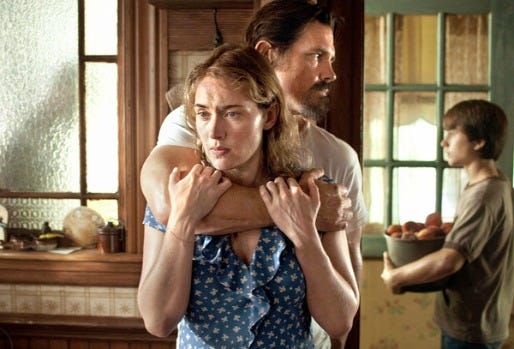Labor Day

"Labor Day" is a movie about the in-between spaces. It's less about the things that we do than how we do them and why. It's about the parts of ourselves we hide from each other — the loneliness, the fear, the crippling sense that things are not turning out as they ought to have. And it's about breaking down these walls we construct around us.
Writer/director Jason Reitman ("Up in the Air"), adapting the novel by Joyce Maynard, tackles a difficult subject matter that, at first blush, sounds ridiculous or even exploitative. And yet the film continually surprises us, believably bending an odd setup into a deeply affecting story.
A wounded divorced mom, Adele (Kate Winslet) is so shut inside her own world that she can barely manage to leave her New England house once a month to buy groceries with her 13-year-old son, Henry (Gattlin Griffith). While shopping, they are accosted by a strange man (Josh Brolin) who has blood on his clothes and is looking for a place to hide.
He turns out to be Frank, an escaped murderer from the local prison who jumped out of a hospital window after having his appendix removed. He more or less forces his way into Adele and Henry's home, and yet he does not seem belligerent. Frank ties up Adele, gathers together food and supplies, and promises to jump aboard the next train through town.
Because it's Labor Day weekend, though, trains are in scarce supply. Meanwhile, police turn the entire town upside down looking for Frank.
And then a weird thing happens. Adele and Henry earn Frank's trust and cease to be his prisoners. He starts fixing things around the dilapidated house, teaches Henry (he calls him "Hank") how to throw a curveball and demonstrates the recipe for the world's best pie crust. Adele, so crushed by her divorce that she has fallen out of love with the very idea of romance, finds herself drawn to this strange, charismatic man.
Through flashbacks and asides, Reitman and his cast delve deeper into each character's past and their potential future. We learn how Frank came to be in prison, why Adele seemed to have given up on life and more about Henry's burgeoning interest in girls, including a morose, sharp-witted newcomer to town (Brighid Fleming).
The performances are uniformly splendid, with young Griffith bringing assurance to the role of a young man who's not at all sure of himself. Winslet, though stumbling a bit with an American accent, projects an aura of fractured goodness.
On paper, Brolin's part is rather thin, but he gives Frank such a deep-centered calmness and sense of purpose it's easy to see why his erstwhile prisoners soon latch onto him. He seems both a hard man and a sensitive one.
"Nothing misleads people like the truth," Frank tells Henry, and much the same could be said about this film. It takes a cheap potboiler scenario and turns it into something completely unexpected and revelatory.
January, normally a cinematic desolation, has delivered a gem.




